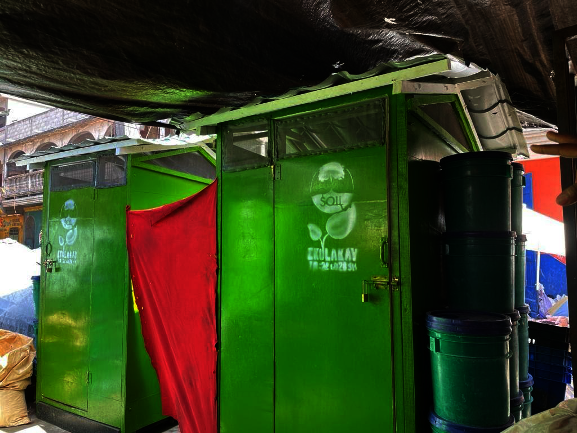By Ashlie Bermudez | Development Associate
In addition to SOIL’s household sanitation service, over this past year – in response to the COVID-19 pandemic – we’ve partnered with local authorities to provide safe sanitation access to public areas around Cap-Haitien, including public toilets at the very busy central market. Responding to the pandemic in communities with low-resources is complex, particularly when it comes to shared public facilities. However, it is evident that not having access to any sanitation option can be more harmful for spreading infectious disease and potentially contaminating scarce water resources. SOIL is proud to provide access to safe and dignified sanitation to mitigate public health crises during these uncertain times. Our public toilets are carefully managed with on-site staff that ensure that toilets are cleaned and sanitized and that users have access to hand-washing stations.
According to Louis, one of SOIL’s public toilet managers, “customers are happy to have toilets in the market and they give lots of positive comments about the quality of the service.” SOIL recently conducted interviews of market-goers to gather feedback so that we can better meet the needs of communities we serve.
SOIL’s Executive Associate, Carine, sat down with Pierre, a public toilet customer and merchant, who offered great feedback. Check out the interview below!
Carine: How did you hear about SOIL?/Did you know about SOIL’s in-home toilets?
Pierre: I heard about SOIL from other merchants and the news of the installations of the in-home toilets is spreading by word of mouth.
Carine: What do you think about the public toilets?
Pierre: Having public toilets is essential for the market. They are different from the type of toilets I am familiar with, but they are clean and don’t smell, just like flush toilets.
Carine: What is the impact that you see EkoLakay (SOIL's toilet) is having in the market and in the city itself?
Pierre: I used to take a taxi to go home when I needed to go to the restroom during the day, or I would go to a friend’s house in the area if it was more urgent. Now I can use the EkoLakay toilet as much as I need during the day. EkoLakay allows people who live further away and who don’t have other options to defecate properly so not to harm the environment.
Carine: Is there anything else you would like to tell us?
Pierre: If SOIL could add more toilets, it would be beneficial so that people don’t stay away from their business for too long while queuing to use the toilets.
While we continue to grow our household sanitation service, we recognize that it is not a one-size-fits-all solution, and providing urban sanitation coverage requires innovation and complimentary safe sanitation options. SOIL is proud to be making strides towards providing much-needed safe and dignified sanitation services in urban Haiti and we will continue to work to fulfill our commitment to the communities we serve; one toilet at a time.
By Ashlie Bermudez | Development Associate
By Eliza Parish | Development Associate
Project reports on GlobalGiving are posted directly to globalgiving.org by Project Leaders as they are completed, generally every 3-4 months. To protect the integrity of these documents, GlobalGiving does not alter them; therefore you may find some language or formatting issues.
If you donate to this project or have donated to this project, you can receive an email when this project posts a report. You can also subscribe for reports without donating.
Support this important cause by creating a personalized fundraising page.
Start a Fundraiser